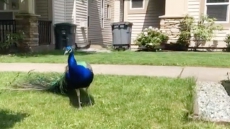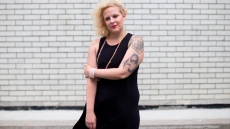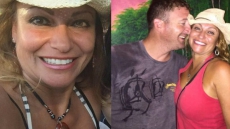VANCOUVER — When Shakila Zareen looked in the mirror for the first time after her worst attack, she didn't recognize herself.
A bullet from a rifle she said was fired by her husband shattered her cheek bone, collapsed her eye socket and took half her nose with it.
"I realized I'm not the person I used to be and I was really frightened," she said in an interview through a Dari interpreter. "I cried and cried, thinking, how did all of this happen to me?"
Zareen, who moved to Canada as a refugee from Afghanistan in January, spoke from a couch in her Vancouver-area apartment where she lives with her sister and mother.
Sun poured through the window into the large and sparsely furnished living room with no decorations. Her family carried few belongings with them except for some photos, including one to remind her of how she looked before the attack.
Now 23, Zareen says she wants to share her story to give other women strength to fight for their rights, and to draw Canadians' attention to what life is like for some women in other countries.
She recently met Prime Minister Justin Trudeau and hopes to continue advocating for diplomatic pressure to reduce gender-based violence and increase women's access to education around the world.
"This is my dream, to be the voice of women. This is my dream, to try my best to help women with their education, to bring up their knowledge, so they can understand that they have rights and that they can stand for their rights," she said.
Zareen said she was 17 when her brother-in-law showed up at her house with a group of armed men, forcing her to marry a man 14 years her senior. He looked dangerous and worked with the Taliban, she said.
"That very first night, he raped me, very violently. And slowly the beatings started. I got hit all the time. They would tell me, 'You're a city girl, you have to learn your lesson.' I was a small girl. But all I was thinking about was that I should not give up, I should fight for my rights," she said.
Zareen started speaking with other girls and women about their rights, too, she said. She told them they didn't deserve to be victims of violence, that they had the right to live, the right to make decisions about their own futures.
This made her husband angrier and more abusive, she said. After one particularly violent incident, she went to the police station in Mazar-i-Sharif to report him.
"I was so hopeful to get some help from them. And they just laughed at me. They said, he's your husband. He can hit you. He hasn't cut off your ear. So I lost all my hope," she said.
When Zareen returned home that night, two or three months after her marriage, her mother was praying and her sister was in the kitchen. She heard a noise and realized her brother-in-law, her husband and several other men had entered the house. She said she began to run and when she looked back, she saw the rifle.
Then, she saw nothing.
Her next memory is of a dream-like state, where she called out to her mother in pain. She was taken to hospital in Mazar-i-Sharif, then transferred to Kabul's emergency ward, where she woke up. She said she touched her face and felt the bandages.
"I suddenly realized what happened, that something had happened to me. I felt very hopeless, I wanted to explain what had happened to me but I couldn't speak," Zareen said. So she wrote what she wanted to say: That she was a victim of domestic violence, as she slipped in and out of consciousness.
She said she had medical and police records in Afghanistan but did not bring them to Canada.
In an interview with the U.K.-based Guardian newspaper, Zareen's brother-in-law denied her allegations and said she shot herself.
Zareen said she never considered being silent, because she knew other women were still in danger.
The United Nations says gender-based violence is a pervasive problem in Afghanistan, stemming from complex inequalities and cultural practices which, when aligned with poverty and lack of awareness, prevents women from acting on or receiving support.
Studies suggest 87 per cent of Afghan women have experienced at least one form of physical, sexual or psychological violence, and 62 per cent have undergone multiple forms of violence, it says on its website.
Zareen said she knows of women whose husbands have cut off their ears, cut their lips or their throats in anger — often, with impunity.
"That's why I want to talk about this. The law is not protecting the women and I want to fight for that," she said.
After she was attacked, Zareen said she was granted entry to India, where she underwent nine reconstructive surgeries and was granted refugee status by the United Nations. She said she finally felt hope when she was told her the United States had accepted her conditionally.
But after President Donald Trump's election, she said that acceptance was rescinded. The letter only cited "security concerns," which she assumed were related to her husband's Taliban connection, she said.
"Yes, maybe my husband worked with the Taliban, but that means he was a bad person, he was a violent person. I was the victim, I was the one who lost her eye, her lips, her nose, her ability for hearing, bones in my face," she said. "What did I do wrong? I was the victim."
A spokeswoman for U.S. Citizenship and Immigration Services said she could not comment on specific cases due to privacy laws.
The rejection launched her into a new level of hopelessness, Zareen said, until she learned she had been accepted to Canada.
Since moving to Canada, Zareen said she feels safe. It's the first time she has felt comfortable taking her bandages off in public. Now, she said she's free to pursue what she's always wanted: education. She spends most of her free time studying English, so she can have a louder voice for women's rights.
"I'm going to school, I have this hope that I can be somebody, some day, and I know that I can make it," she said.
When she looks in the mirror now, she sees herself.
"Now when I look in the mirror, I don't feel different. I feel like I'm just another human, like everyone else. After all, what you look like is not really that important. Who you are is important. And today I am a happy person."



